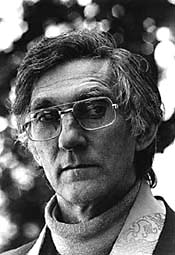 The subject of the “cultural appropriation” of Eastern forms of Buddhism by Western Buddhists crops up every now and then and in fact there is an excellent article by Funie Hsu in this quarter’s edition of Buddhadharma on this very subject.
The subject of the “cultural appropriation” of Eastern forms of Buddhism by Western Buddhists crops up every now and then and in fact there is an excellent article by Funie Hsu in this quarter’s edition of Buddhadharma on this very subject.It’s a fact not lost on practitioners here in the UK either. When Sangharakshita (the Dharma name of Dennis Lingwood) founded the, Friends of the Western Buddhist Order, or FWBO (now known as the Triratna Buddhist Community) it was “an attempt to translate the ideas and practices of Buddhism into Western languages. The non-denominational nature of the Triratna Buddhist Community, its equal ordination for both men
and women, and its evolution of new forms of shared practice, such as what it calls team-based right livelihood projects, have been cited as examples of such "translation", and also as the creation of a "Buddhist society in miniature within the Western, industrialized world” (Brassard, Francis (2000), The Concept of Bodhicitta in Śāntideva's Bodhícaryāvatāra).
The FWBO and Triratna draw their teachings from all the major schools of Buddhism to produce a “Western version” of the Dharma.
Another approach has been to “strip” the Buddha’s teachings of any “mythological” content and even to remove any elements that are to be found in other schools of philosophy contemporaneous with the Buddha. This approach, promoted by Western Buddhists such as Stephen Batchelor and John Peacock, has become known as Secular Buddhism.
This has the appeal of providing the Western practitioner with a “culture free” Dharma which can be practised without feeling that one is pretending to be Asian. However, for many of us there is the feeling that we run the danger of throwing the baby out with the bath water and losing essential elements of the Buddha’s teaching just because they do not fit in with some politically correct secular filter.
This however leads to the question of where does it all stop; to what extent can the Dharma be watered down and still be the Dharma?
While carrying out a regular check on the functionality of the links on this site I found that the one for Secular Buddhism UK is now defunct. On their associated Facebook page I found the following –
“Secular Buddhism UK (and associated website) are no longer active. However, several former SBUK members have since formed The Middle Way Society www.middlewaysociety.org, which visitors to this page may also be interested in. The MWS shares some of the aims of SBUK, but is nonetheless, independent of Buddhism.”
So there you go, you can water down the Buddha’s teachings to the point where they are no longer Buddhism.

If you seek to learn anything from the Buddha's teachings, presumably quite early on there will be anatta - the recognition that our ideas about 'essences' are our own construction. One's construction of 'Buddhism' is just as subject to this as anything else. If you want to follow the Buddha's experimental example in his early life as he discovered the Middle Way you will be similarly inclined to learn from but move beyond absolutised teachings that are no longer practically helpful, as the Buddha moved on from Alara Kalama and Udaka Ramaputta, the the 5 ascetics. Thus I find it very ironic when Buddhists try to essentialise Buddhism and write in dismissive terms about those who want to follow the spirit of the Middle Way wherever it leads.
ReplyDeleteThe Middle Way Society is indeed independent of Buddhism, as I would have thought anyone who wants to make use of the Buddha's insights would want to be. That doesn't mean that one can't make use of what one can learn from the Buddhist or any other tradition, but that one is not subjected to the authority of a tradition. For a Buddhist to give absolute authority to that tradition and also to want to follow the Buddha's example seems contradictory. But you have made huge and inaccurate assumptions about our motives which presumably stem from a failure to investigate what we actually do. It has nothing to do with political correctness or secularism, nor is it 'watering down' the Buddha's insights, but rather seeking a universal practical method that the Buddha's insights share with those of other individuals and traditions to varying degrees. We can hardly be losing essential elements of Buddha's teaching' when Buddha's teaching involves there being no such essential elements to anything. Only critical investigation in the light of experience can help us to understand and apply what we learn from sources like the Buddha, and the uncritical adoption of tradition is antipathetic to that process of human investigation.